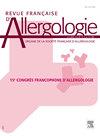Prise en charge des allergies professionnelles dans les services de prévention en santé au travail dans le département des Bouches-du-Rhône : enquête de satisfaction auprès des médecins du travail et proposition d’un projet innovant
IF 0.3
4区 医学
引用次数: 0
Abstract
Aim of the study
To study the preventive management of employees exposed to the risk of occupational allergy and occupational physicians’ satisfaction in the Bouches-du-Rhône department. The secondary objective was to study occupational physicians’ interest in an innovative project to set up an occupational allergy unit within the occupational health prevention department.
Patients and methods
Descriptive, cross-sectional epidemiological study including occupational physicians working in an occupational health prevention service in the Bouches-du-Rhône who responded to the questionnaire.
Results
According to the 50 occupational physicians who took part in the study, the preventive management of occupational allergies in their department was judged to be in need of improvement (88%, i.e. 44 of occupational physicians). Primary prevention (n = 37 or 74%) is most concerned along with secondary prevention (n = 33 or 66%). Tertiary prevention was considered to be improvable to a lesser extent (n = 24 or 48%). The majority of occupational physicians (n = 32 or 64%) believe that the presence of this unit would be beneficial in improving the management of occupational allergies within their occupational health department.
Conclusion
A majority of occupational physicians consider that practice can be improved, mainly in terms of primary and secondary prevention. The high level of support for the innovative project among occupational health physicians justifies its creation within the occupational health prevention department. In the future, the project will be evaluated to prove its usefulness and relevance.
在Bouches-du- Rhone省的职业健康预防服务中处理职业过敏问题:对职业医生的满意度进行调查,并提出一个创新项目
研究目的研究罗讷河口省对暴露于职业过敏风险的员工的预防性管理以及职业医师的满意度。次要目的是研究职业医师对在职业健康预防部门内设立职业过敏科这一创新项目的兴趣。患者和方法描述性、横断面流行病学研究,包括在罗讷河口省职业健康预防部门工作并回答问卷的职业医师。一级预防(37 人,占 74%)和二级预防(33 人,占 66%)最受关注。三级预防的可改进程度较低(24 人,占 48%)。大多数职业医师(n = 32 或 64%)认为,在其职业健康部门内设立该单位将有利于改善职业过敏症的管理。职业健康医生对该创新项目的高度支持证明,在职业健康预防部门内设立该项目是合理的。今后,将对该项目进行评估,以证明其实用性和相关性。
本文章由计算机程序翻译,如有差异,请以英文原文为准。
求助全文
约1分钟内获得全文
求助全文
来源期刊

Revue Francaise d Allergologie
Medicine-Immunology and Allergy
自引率
33.30%
发文量
349
期刊介绍:
La Revue Française d''Allergologie : un véritable forum pour faire connaître des travaux originaux et permettre la diffusion de l''information auprès de toutes les spécialités concernées par les pathologies allergiques. La Revue Française d''Allergologie (8 numéros par an) est au carrefour de nombreuses spécialités - dermatologie, pédiatrie, ORL, pneumologie, ophtalmologie, médecine interne - qui, toutes, ont à traiter des maladies allergiques. Les symptômes des allergies fondés sur des mécanismes communs sont le plus souvent associés et se succèdent chez un même patient. En forte progression depuis 20 ans, les maladies allergiques sont dans l''attente de perfectionnements et d''avancées thérapeutiques qui permettront aux nombreux patients qui en sont atteints de mieux vivre avec leurs allergies. La Revue Française d''Allergologie se veut donc un véritable forum de discussions et d''échanges entre tous les spécialistes confrontés aux pathologies
 求助内容:
求助内容: 应助结果提醒方式:
应助结果提醒方式:


